- Home
- Elizabeth George
A Traitor to Memory Page 11
A Traitor to Memory Read online
Page 11
“So soon?” Webberly set his shoes to one side. “We've had you barely forty-eight hours. Cambridge can wait another day, can't it?”
“Duty calls, Dad. Not to mention the odd exam or two. You still want me to try for a first, I take it?”
“Hang on, then. Let me finish with these shoes and I'll drive you up to King's Cross Station.”
“No need. I'll go by tube.”
“Then I'll run you up to the Underground.”
“Dad.” Her voice was a model of patience. They'd walked this path often in her twenty-two years, so she was well-used to its twists and turns. “I need the exercise. Explain it to him, Mum.”
Webberly protested. “But if it begins to rain on your way—”
“Heavens, Malcolm, she's not going to melt.”
But they do, Webberly countered, in his mind. They melt, they break, they disappear in an instant. And always when melting, breaking, or disappearing is the very last possibility in your head. Still, he knew the wisdom of compromise in a situation in which two females were beginning to join forces against him. So he said, “I'll walk a bit with you, then.” And he added, “Alf needs his morning toddle, Randie,” when Miranda rolled her eyes and was about to remonstrate against the idea of a father chaperoning his adult daughter down the street in broad daylight as if she were incapable of using a zebra crossing on her own.
“Mum?” Miranda looked to her mother for support. Frances said with a regretful shrug, “You've not taken Alfie yet yourself, have you, darling?”
Miranda surrendered with good-natured exasperation. “Oh, come along then, you twit. But I'm not waiting for the shoe polish routine to be done.”
“I'll see to the shoes,” Frances said.
Webberly fetched the dog's lead and followed his daughter out of the house. Outside, Alfie rooted an old tennis ball from the shrubbery. He knew the routine when Webberly was on the other end of the lead: It would be a stroll to Prebend Gardens, where his master would unhook the lead from his collar and throw the tennis ball across the grass, whereupon Alfie would dash after it, refuse to return it, and run wildly around for at least a quarter of an hour.
“I don't know who has less imagination,” Miranda said as she watched the dog snuffle through the hydrangeas, “you or the dog. Just look at him, Dad. He knows what's up. There's not the least bit of surprise in store for him.”
“Dogs like routine,” Webberly told her as Alfie emerged triumphant, a hairy old ball in his jaws.
“Dogs, yes. But what about you? Do you always take him to the gardens, for God's sake?”
“It's my walking meditation twice a day,” he told her. “Morning and night. Doesn't that satisfy?”
“Walking meditation,” she scoffed. “Dad, you're such a fibber. Really.” They set off to the right once beyond the front gate, following the dog to the end of Palgrave Street, where he made the expected left turn that would take them up to Stamford Brook Road and Prebend Gardens that lay just on the other side of it.
“It was a good party,” Miranda said, linking her arm through her father's. “Mum seemed to like it. And no one mentioned … or wondered … at least not to me …”
“It was fine,” Webberly said, squeezing his arm to his side to hold her closer. “Your mother enjoyed herself so much she was talking about working in the garden today.” He felt his daughter looking at him but he kept his own eyes resolutely forward.
Miranda said, “She won't. You know she won't. Dad, why don't you insist she go back to that doctor? There's help for people like Mum.”
“I can't force her to do more.”
“No. But you could …” Miranda sighed. “I don't know. Something. Something. I don't understand why you won't take a stand, why you've never taken a stand with Mum.”
“What d'you have in mind?”
“If she thought you meant to … well, if you said, ‘This is it, Frances. I'm at my limit. I want you to go back to that psychiatrist or else.’”
“Or else? What?”
He could feel her deflate. “Yes. That's just it, isn't it? I know you'd never leave her. Well, of course, how could you and live with yourself? But there's got to be something you—we—haven't thought of yet.” And then apparently to spare him from having to answer, she noted that Alfie was eyeing a cat up ahead of them with too much interest. She took the lead from her father and said, “Don't even think of it, Alfred,” with a little jerk.
At the corner, they crossed and there they parted fondly, Miranda heading to the left, which would ultimately take her in the direction of Stamford Brook Underground station and Webberly striding onward along the green iron railings that formed the east boundary of Prebend Gardens.
Inside the wrought iron gate, Webberly took the dog off his lead and wrested the tennis ball from his jaws. He flung it as far as he could down the length of the green and watched as Alfie raced after it. Once the ball was in the dog's possession, Alfie did his usual: He loped to the far end of the lawn and began to race round the perimeter of the green. Webberly watched his progress from bench to bush to tree to path, but he himself remained where they'd entered, moving only to the paint-chipped black bench a short distance from the notice board on which announcements of coming events in the community were posted.
These he read without actually assimilating them: Christmas fêtes, antiques fairs, car boot sales. He noted with approval that the phone number of the local police station was prominently displayed and that a committee hoping to organise a Neighbourhood Watch programme was going to assemble in the basement of one of the churches. He saw all this but he couldn't have testified to any of it later. Because although he perceived those six or seven pieces of paper pinned behind the glass of the notice board, and although he went through the motions of reading each one of them, what he actually observed was Frances standing at the kitchen window while his daughter said kindly and with absolute faith in him, Of course you'd never leave her … how could you? That last especially seemed to reverberate round his skull like an echo with a killing sense of irony.
Leaving Frances had been the last thing on his mind that night he'd got the call to go to Kensington Square. The call had come via the Earl's Court Road station, where he was a recently promoted detective inspector with a newly assigned sergeant—Eric Leach—as his partner. Leach did the driving down Kensington High Street, which in those days was moderately less jammed than it tended to be now. Leach was new to the borough, so they overshot the mark and ended up winding through Thackery Street, with its small-village feel so at odds with a huge city, and coming into the square from its southeast end. This put them directly in front of the house they were seeking: a red brick Victorian affair with a white medallion at the gable's peak giving the date of construction: 1879, relatively new in an area where the oldest building had been raised nearly two hundred years earlier.
A panda car, a tandem arrival at the scene along with the paramedics when the emergency call had first come through, still sat at the kerb although its lights were no longer flashing. The paramedics themselves were long since gone, as were the neighbours, who had doubtless assembled as neighbours will do when sirens scream into a residential area.
Webberly shoved open his door and walked to the house, where a low brick wall surmounted by black wrought iron fenced in a flagstone area with a central planter. An ornamental cherry tree grew there, and at that time of year it created a roseate blossom pool on the ground.
The front door was closed, but someone inside must have been waiting for them, because no sooner had Webberly put his foot on the bottom step than the door swung open and the uniformed constable who'd placed the call to the station admitted them into the house. He looked shaken. This was his first call to a child's death, he told them. He'd arrived in the wake of the ambulance.
“Two years old,” he informed them in a hollow voice. “Dad'd been giving her kiss of life and the 'medics tried everything they could.” He shook his head, looking stricken. “No chance. S
he was gone. Sorry, sir. I've a baby at home. Makes you think …”
“Right,” Webberly said. “It's okay, son. I've a little one myself.” He needed no reminding how fleeting life was, how vigilant a parent needed to be against anything that might snuff that life out. His own Miranda had just turned two.
“Where'd it happen?” Webberly asked.
“In the bath. Upstairs. But don't you want to talk to …? The family're in the drawing room.”
Webberly didn't need a young PC to tell him his business, but the boy was rattled, so there was no point sorting him out right then. He looked at Leach instead. “Tell them we'll be with them shortly. Then …” He jerked his head towards the stairs. He said to the constable, “Show me,” and he followed him up a staircase that curved round an ornate oak plant stand from which an enormous fern drooped fronds towards the floor.
The nursery bathroom was on the second floor of the house along with the nursery, a loo, and another bedroom that was occupied by the other child in the family. The parents and grandparents had rooms just below on the first floor. The top floor was occupied by the nanny, a lodger, and a woman who … well, the constable supposed she'd be called a governess although the family didn't call her that.
“She teaches the children,” the constable said. “Well, perhaps just the older one, I expect.”
Webberly raised his eyebrows at the oddity of a governess in this day and age, and he went into the bathroom where the tragedy had occurred. Leach joined him there, his duty done in the drawing room below. The constable returned to his post by the front door.
The two detectives surveyed the bathroom somberly. It was a mundane location for sudden death to make its mark. And yet it happened so often that Webberly wondered when people would finally learn not to leave a child unattended for even a second when it came to so much as an inch of water anywhere.
There was more than an inch of water in the tub, however. At least ten inches remained inside, cool now and with a plastic boat and five yellow ducklings floating motionless on its surface. A bar of soap rested on the bottom near the drain, and a stainless steel bath tray with worn rubber ends bridged the width of the tub and held a limp flannel, a comb, and a sponge. All of it looked perfectly normal. But there was also an indication that both panic and tragedy had been recent visitors to the room.
To one side, a towel rack lay overturned on the floor. A soaked bath mat was crumpled beneath a wash basin. A rattan wastepaper basket had been caved in. And across the white tiles were the footprints of the paramedics whose last concern would have been to keep the room neat and tidy as they attempted to revive a child.
Webberly could picture the scene as if he'd been there because he had been there before while on uniformed patrol: no panic among the 'medics but rather intense and what seemed like inhumanly impersonal calm; checks for pulse and respiration, for reaction from the pupils; the immediate initiation of CPR. They would know she was dead within moments but they would not say those words to anyone because their job was life, life at any cost, life at every cost, and they would work upon the child and whisk her from the house and continue to work upon her all the way to the hospital because there was always the chance that life could be wrung from the limp tatter that remained when the spirit left the body.
Webberly squatted by the wastepaper basket and used a pen to right it, having a look inside. Six crumpled tissues, perhaps half a yard of dental floss, a flattened tube of toothpaste. He said to Leach, “Check the medicine cabinet, Eric,” while he himself went back to the tub and looked long and hard round its sides, round its taps and its spigot, along the grout that edged it, and into its water. Nothing.
Leach said, “Baby aspirin in here, cough syrup, some prescriptions. Five of them, sir.”
“For who?”
“Made out for Sonia Davies.”
“Note them all, then. Seal off the room. I'll speak to the family.”
But it was more than the family he met in the drawing room because more than the family lived in the house, and more than only the house's inhabitants had been present when the tragedy supervened in their evening rituals. Indeed, the drawing room seemed to be bursting with people although there were but nine individuals present: eight adults and a small boy with an appealing fall of white-blond hair across his forehead. Chalky-faced, he stood in the protective circle of the arm of an old man who was, presumably, his grandfather and whose necktie—a souvenir of some college or club by the look of it—the boy grasped and twisted in his fingers.
No one spoke. They looked in shock, and they seemed to be grouped to offer each other what support they could. Most of this was being directed at the mother, who was sitting in one corner of the room, a woman in her thirties like Webberly himself, but whey of complexion with large eyes that were haunted and seeing again and again what no mother ever ought to see: her child's limp body in the hands of strangers who fought to save her.
When Webberly introduced himself, one of the two men who were hovering near the mother rose and said he was Richard Davies, the father of the child who'd been taken to hospital. The use of the euphemism was clear when he gave a glance in the direction of the little boy, his son. Wisely, he didn't wish to speak of the other child's death in front of her brother. He said, “We were at the hospital. My wife and I. They told us—”
At this a young woman—seated on a sofa accompanied by a man of her own age with his arm round her shoulders—began to cry. It was a horrible, guttural weeping that grew to the sort of sobs that lead to hysteria. “I do not leave her,” she keened, and even through her lamentation Webberly could hear her heavy German accent. “I swear to God almighty that I do not leave her for even a minute.”
Which begged the question of how she had died, of course.
They all needed to be interviewed, but not simultaneously. Webberly said to the German girl, “You were responsible for the child?”
At which the mother said, “I brought this down upon us.”
“Eugenie!” Richard Davies cried, and the other man who'd been hovering over her, his face shining with a patina of sweat, said, “Don't talk like that, Eugenie.”
The grandfather said, “We all know who's at fault.”
The German girl wailed, “No! No! No! I do not leave her!” while her companion held her and said, “It's okay,” which it patently was not.
Two people said nothing: an elderly woman who kept her eyes glued onto Granddad and a tomato-haired woman in a neat pleated skirt who watched the German girl with undisguised dislike.
Too many people, too much emotion, growing confusion. Webberly told them all to disperse, save the parents. Remain in the house, he directed them. And someone stay with the little boy.
“I'll do that,” Tomato-hair said, obviously the “governess” about whom the young PC had spoken. “Come along, Gideon. Let's have a look at your maths.”
“But I'm to practise,” the boy said, looking earnestly from one adult to another. “Raphael did tell me—”
“Gideon, it's all right. Go with Sarah-Jane.” The sweat-faced man left the mother's side, going to squat before the little boy. “You're not to worry about your music just now. Go with Sarah-Jane, all right?”
“Come along, lad.” Grandfather stood, the little boy in his arms. The rest of the group followed him from the room till only the parents of the dead child remained.
Even now in the garden in Stamford Brook, with Alfie barking at the birds and chasing the squirrels and waiting for his master to call him back to the lead, even now in this park Webberly could see Eugenie Davies as she had been on that long-ago evening.
Dressed simply in grey trousers and a pale blue blouse, she didn't move an inch. She didn't look at him or at her husband. She only said, “Oh my God. What's to become of us?” And even then she spoke to herself, not to the men.
Her husband said, but rather to Webberly and not in answer to her, “We went to the hospital. There was nothing they could do. They didn't tell us tha
t here. At the house. They didn't tell us.”
“No,” Webberly said. “That's not their job. They leave that to the doctors.”
“But they knew. While they were here. They knew then, didn't they?”
“I expect so. I'm sorry.”
Neither of them wept. They would, later, when they realised that the nightmare they were currently experiencing was no nightmare at all but rather an extended reality that would colour what remained of their lives. But at the moment, they were dull with trauma: the initial panic, the crisis of frantic intervention, the invasion of strangers into their home, the agonising wait in a casualty ward, the approach of a doctor whose expression undoubtedly had said it all.
“They talked about releasing her later. The … her body,” Richard Davies said. “He said we couldn't take her, couldn't make any arrangements…. Why?”
Eugenie's head lowered. A tear dropped onto her folded hands.
Webberly drew a chair over so that he was on the same level as Eugenie and he nodded to Richard Davies to sit as well, which he did, next to his wife, whose hand he took. Webberly explained to them as best he could: When an unexpected death occurred, when someone died who was not under the care of a physician who could sign a death certificate, when someone died in an accident—like a drowning—then a post-mortem examination was required by law.
Eugenie looked up. “Are you saying they'll cut her up? Cut her open?”
Webberly skirted the question by saying, “They'll determine the exact cause of her death.”
“But we know the cause,” Richard Davies said. “She … my God, she was in the bath. And then there was shouting, the women screaming. I ran upstairs and James came tearing down from—”
“James?”
“He lodges with us. He was in his room. He came running.”
“Where was everyone else?”
Richard looked to his wife for some sort of answer. She shook her head, saying only, “Mother Davies and I were in the kitchen, starting dinner. It was Sonia's bath time and …” She hesitated, as if saying her daughter's name made more real what she could not bear to think about.

 Well-Schooled in Murder
Well-Schooled in Murder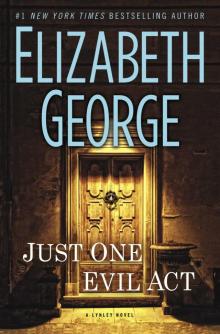 Just One Evil Act
Just One Evil Act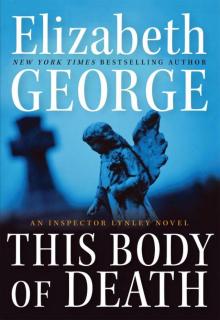 This Body of Death
This Body of Death The Edge of the Water
The Edge of the Water For the Sake of Elena
For the Sake of Elena Believing the Lie
Believing the Lie The Edge of the Shadows
The Edge of the Shadows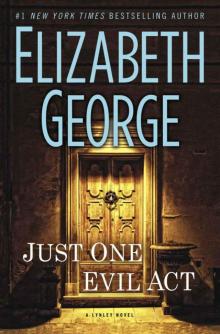 Just One Evil Act: A Lynley Novel
Just One Evil Act: A Lynley Novel In Pursuit of the Proper Sinner
In Pursuit of the Proper Sinner A Moment on the Edge:100 Years of Crime Stories by women
A Moment on the Edge:100 Years of Crime Stories by women Elizabeth I
Elizabeth I I, Richard
I, Richard A Traitor to Memory
A Traitor to Memory Missing Joseph
Missing Joseph A Suitable Vengeance
A Suitable Vengeance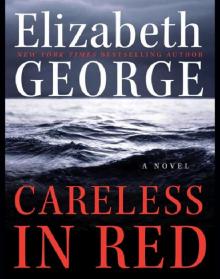 Careless in Red
Careless in Red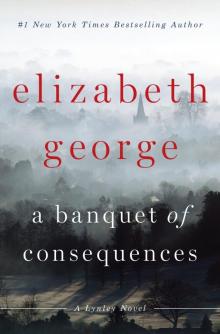 A Banquet of Consequences
A Banquet of Consequences Playing for the Ashes
Playing for the Ashes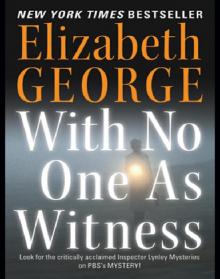 With No One As Witness
With No One As Witness Deception on His Mind
Deception on His Mind The Best American Mystery Stories 2016
The Best American Mystery Stories 2016 A Great Deliverance
A Great Deliverance In the Presence of the Enemy
In the Presence of the Enemy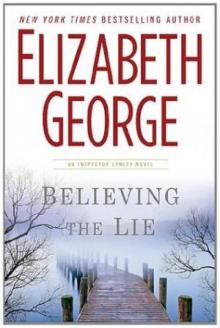 Believing the Lie il-17
Believing the Lie il-17 The Edge of the Light
The Edge of the Light SW01 - The Edge of Nowhere
SW01 - The Edge of Nowhere A Place of Hiding
A Place of Hiding What Came Before He Shot Her il-14
What Came Before He Shot Her il-14 Payment In Blood
Payment In Blood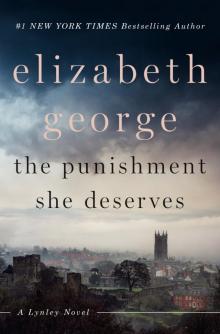 The Punishment She Deserves
The Punishment She Deserves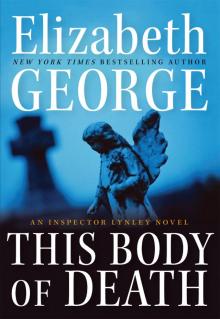 This Body of Death: An Inspector Lynley Novel
This Body of Death: An Inspector Lynley Novel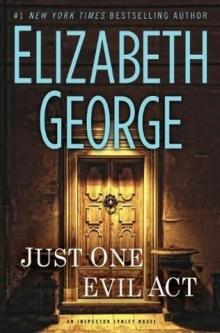 Just One Evil Act il-18
Just One Evil Act il-18 What Came Before He Shot Her
What Came Before He Shot Her Missing Joseph il-6
Missing Joseph il-6